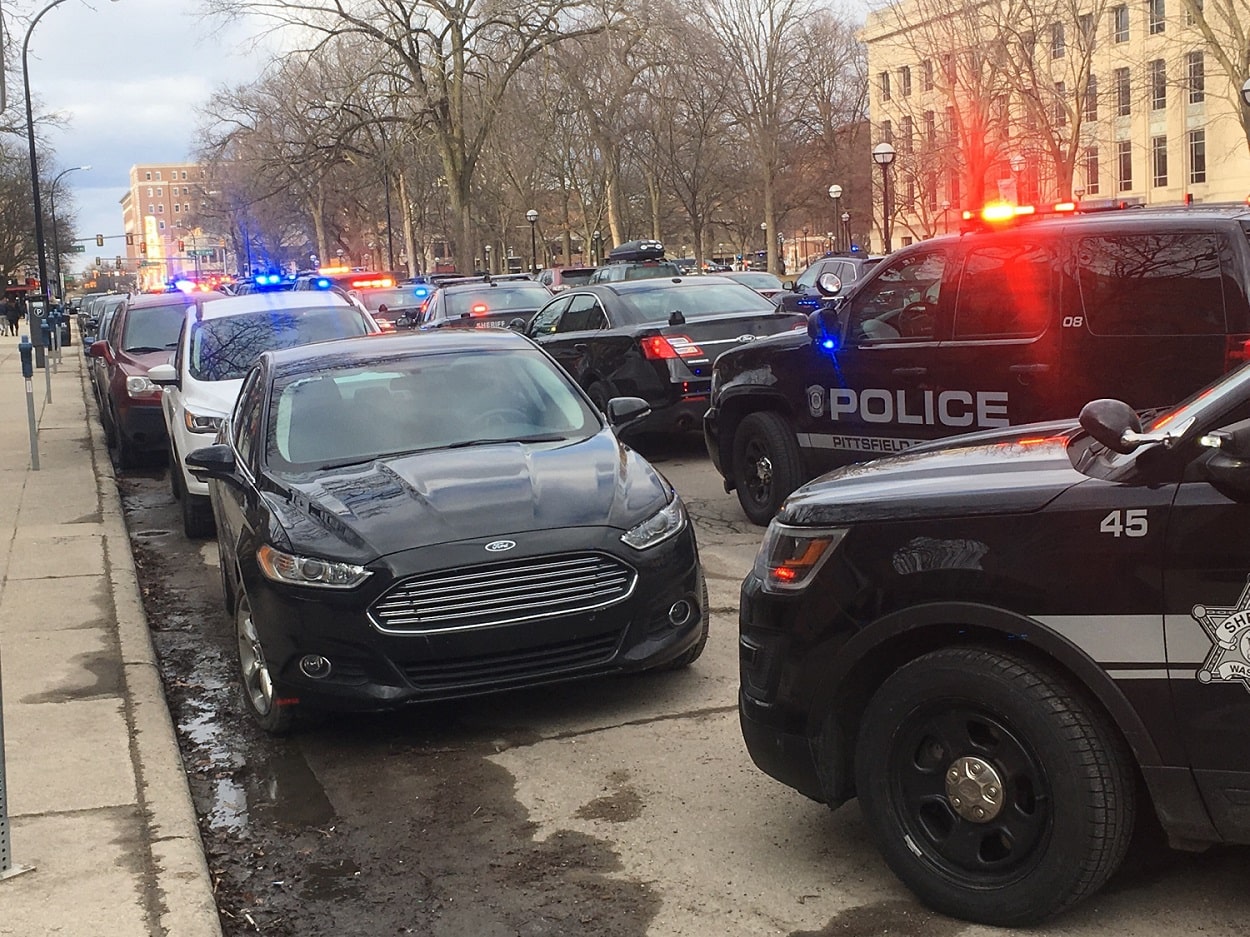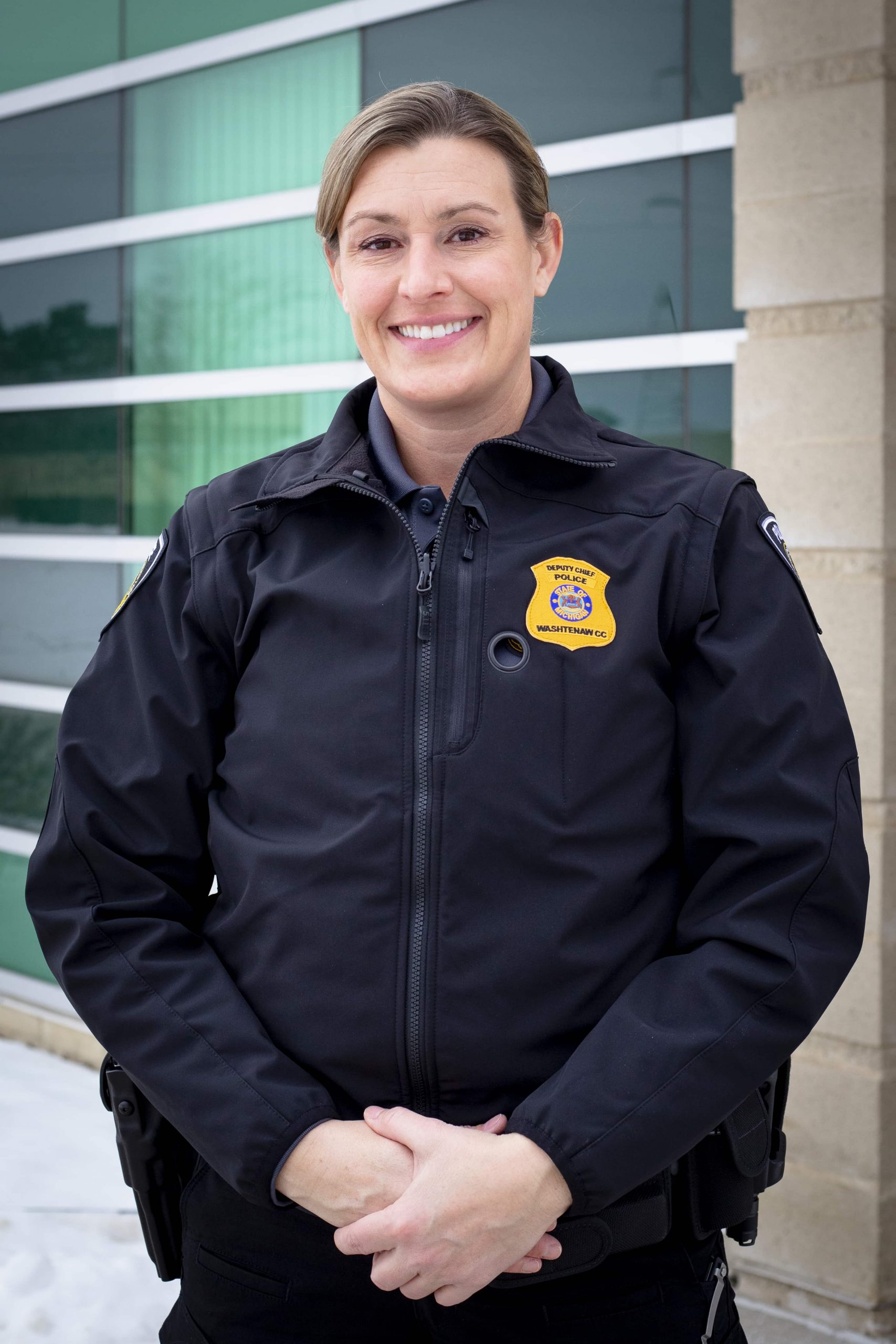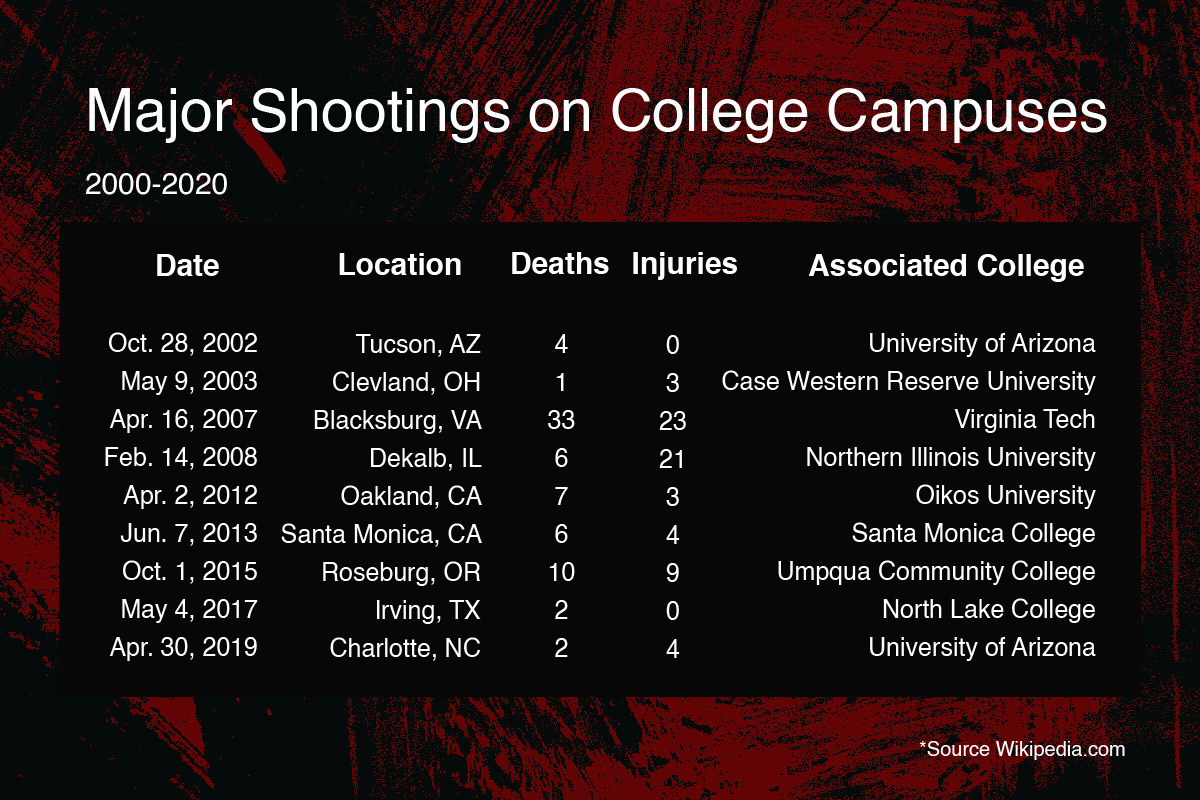
Ann Arbor Police Department cruisers at State St. on March 16, 2019 as the University of Michigan was locked down due to active shooter threat. Nicholas Ketchum | Washtenaw Voice
by JORDAN SCENNA
Deputy Editor
Warning: The following article discusses violence and may be uncomfortable for some readers.
This is the first of a two-part series. Tomorrow, a look at mental health services.
When a group of young women charged into the dining room of Slurping Turtle in the spring of 2019, nothing seemed out of the ordinary. The group, clad in green get-up for an early St. Patrick’s Day outing, was a common sight for the staff of the ramen shop located in Ann Arbor near the University of Michigan campus. Groups of students poured in day and night to enjoy house-made noodles and hand-rolled sushi; but on this day, something was different.
As the group barreled toward the back of the restaurant, tears mixed with green eyeshadow coursed down crimson cheeks. They stumbled over each other, racing to make their way to the basement where the store’s bathrooms were located. The staff, stunned by the whirlwind of panic, was soon to learn the horrifying truth. Between frantic breaths and hurried steps one of the girls managed to utter three words that are a student’s worst nightmare.
“There’s a shooter!”
Thankfully for the students that day it was a false alarm. A sorority was in the middle of a team-building exercise that included the popping of balloons. The loud bursts were mistaken for the crack of gunshots, and calamity ensued. The incident on the U of M campus was a harrowing reminder that mass shootings aren’t confined to high schools, like the recent tragedy at Oxford in nearby Oakland County that claimed four lives. They are an inescapable reality for colleges across the country.
The threat is real
How prepared are we?

Interim Chief Jamie Zecman poses in front of the Public Safety office located in the parking garage on WCC campus. Shelby Beaty | Washtenaw Voice
Jamie Zecman motions to the patch on the front of her uniform. It reads “Deputy Chief” in bold black letters. With another gesture she points to the Glock 17 on her right hip. She’s trying to communicate an irrefutable fact; she is in charge of campus safety at Washtenaw Community College. Zecman wants students to know that when they step onto campus, they have nothing to fear.
“WCC is a safe campus to attend, and we have staff and procedures in place to provide very effective safety,” Zecman said.
Zecman was hired as WCC’s deputy chief in Nov. 2021 and is currently serving as the interim Chief after Scott Hilden left to head the Northville Police. She is a 23-year law enforcement veteran with former posts in Bay City and Clio, as well as serving 17 years at Saginaw Valley State University. Sgt. Marc Strain, a fellow officer at Saginaw Valley describes Zecman as a fierce interrogator.
“(Zecman) got a lot of confessions and solved a lot of crimes,” Strain said. “I’ve been around a long time and I’ve only seen a few officers with that ability. They open up to her. If she got them to come in, they were going to confess.”
Strain is confident that if Zecman becomes top-cop the students at Washtenaw will be in good hands. “If she’s made chief, she’ll do a great job.”
Under her command are seven sworn officers who monitor campus activity. She also has a group of non-sworn public safety officers that help the department by escorting people to their cars and observing the day-to-day movements at the college. Zecman considers these officers indispensable.
“(The non-sworn officers) are extremely valuable, we couldn’t do it without them,” Zecman said.
In case of an active shooter on campus, Zecman is fully prepared. Protocols have been established to keep students safe and away from danger. An emergency alert notification goes out to students (students can sign up for this service by logging in to MyWCC and clicking WCC alert-Emergency Notification Service) by text and email describing the situation and key locations to stay away from. There would be an immediate response by all police on campus. WCC officers train with the Washtenaw County Sheriff’s Department and have also completed ALICE training.
ALICE stands for Alert, Lockdown, Inform, Counter, Evaluate. According to the ALICE official website, ALICE is a widely adopted, effective method of active shooter response training. It has been used by Washtenaw schools since 2013. ALICE training is usually conducted annually for officers, faculty, and staff, but has been suspended due to Covid. Zecman hopes to resume training as soon as possible.
David Waskin, a journalism professor, and ALICE class alum, hopes the training will have an impact in case of a threat.
“I don’t think you can ever prepare for a situation like this,” Waskin said. “Training gave me the steps to try to act in case of an emergency.”
Depending on the situation, WCC can also call in outside assistance, having a mutual aid agreement with the Sheriff’s Department, Michigan State Police, and Pittsfield Township.
Bill Chapman, an HVAC student in his last semester, finds peace of mind in the systems WCC have in place; from the immediacy of digital updates to the noticeable police presence on campus.
“They seem to have their ducks in a row,” Chapman said. “The fact that I receive emails and texts about any possible danger puts me at ease, and the presence of police activity makes me feel safe.”
Intensive police involvement has already curtailed a possible situation during Zecman’s short, but productive tenure. According to Zecman, after the Oxford shooting there was an increased anxiety and fear among faculty and students, especially in the Washtenaw Technical Middle College which provides high-school students early access to college credits. Zecman received a tip on Dec. 3, that while a student was working out a math problem, they thought they overheard one of their classmates say they were going to “kill themselves” or “someone else.” After a thorough investigation was completed it was determined there was no credible threat, according to Zecman.
“It wasn’t corroborated,”Zecman said. “It’s important we do our due diligence to make sure (these allegations) aren’t credible.”
Resources including educational and emotional support were made available to the student and the case was closed.
What to do if the shooting starts?
In case of an active shooter WCC wants you to follow the RUN HIDE FIGHT protocol.
RUN
- Have an escape route and plan in mind
- Leave your belongings behind
- Keep your hands visible
HIDE
- Hide in an area out of the shooter’s view
- Block entry to your hiding place and lock the doors
- Silence your cell phone
FIGHT
- As a last resort and only when your life is in imminent danger
- Attempt to incapacitate the shooter
- Act with physical aggression and throw items at the active shooter
According to the Department of Homeland Security, following these steps along with having an Emergency Action Plan (WCC’s can be found at https://www.wccnet.edu/public-safety/) and ALICE training will prepare you to effectively respond and minimize the loss of life.
To report a crime or any suspicious behavior you can call Washtenaw College Public Safety at 734-973-3411. Email: publicsafety@wccnet.edu
If you or anyone you know is struggling with mental health issues you can contact the counseling office at 734-677-5223 or fill out an in-take form at https://www.wccnet.edu/succeed/personal/counseling/
For more information about public safety policy and procedures please visit https://www.wccnet.edu/public-safety/
Editor’s Note: The author of this article is a former employee of Slurping Turtle restaurant and experienced first hand what occurred in March 2019.



